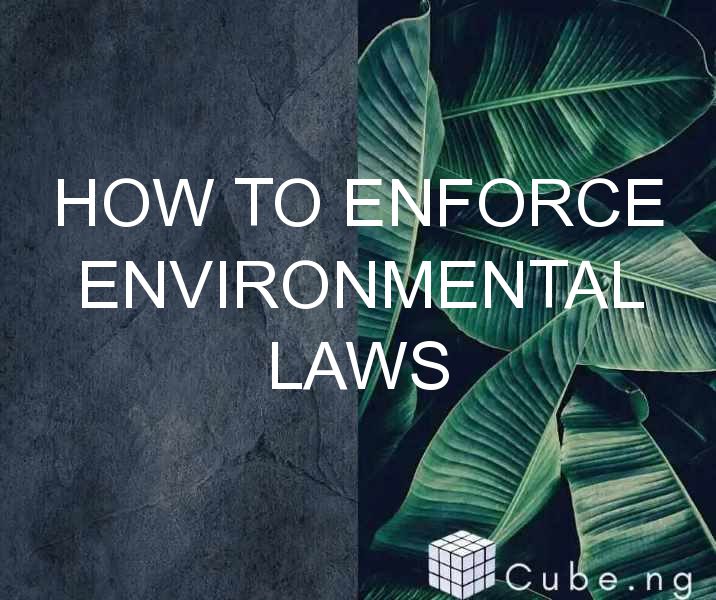Table of Contents
- How to Enforce Environmental Laws
- Understanding Environmental Laws
- Why Enforce Environmental Laws?
- The Importance of Compliance
- Steps to Enforce Environmental Laws
- Challenges in Enforcing Environmental Laws
- Conclusion
- FAQs
- Q1. What are some of the environmental laws in place?
- Q2. What are the consequences of non-compliance with environmental laws?
- Q3. Who is responsible for enforcing environmental laws?
- Q4. What are some of the challenges in enforcing environmental laws?
- Q5. Why is compliance with environmental laws important?
How to Enforce Environmental Laws
The environment is a precious resource that needs to be protected for the present and future generations. Environmental laws are in place to regulate activities that may have adverse effects on the environment. However, it is not enough to have environmental laws on paper; they must be enforced for them to have any impact. This article will discuss how to enforce environmental laws.
Understanding Environmental Laws
Before we dive into how to enforce environmental laws, it is essential to understand what they are. Environmental laws are a set of rules and regulations that are designed to protect the environment from harm. They cover a wide range of activities, including air and water pollution, waste management, and natural resource management.
Environmental laws are enforced by various agencies at the federal, state, and local levels. The Environmental Protection Agency (EPA) is the primary federal agency responsible for enforcing environmental laws. However, many states have their own environmental agencies responsible for enforcing state-level environmental laws.
Why Enforce Environmental Laws?
The enforcement of environmental laws is crucial because they help to protect the environment from harm. Environmental harm can have severe consequences, including damage to public health, ecosystems, and the economy. Enforcing environmental laws helps to ensure that companies and individuals are held accountable for their actions that may have adverse effects on the environment.
The Importance of Compliance
Compliance with environmental laws is essential for the success of environmental protection efforts. Compliance means following the environmental laws and regulations that are in place. Compliance ensures that companies and individuals are doing their part in protecting the environment. Non-compliance can lead to penalties, fines, and other legal consequences.
Steps to Enforce Environmental Laws
The following are steps that can be taken to enforce environmental laws:
Step 1: Identifying Violations
The first step in enforcing environmental laws is identifying violations. Environmental agencies use various methods to identify violations, including inspections, monitoring, and reporting. Once a violation is identified, the agency will investigate to determine the severity of the violation.
Step 2: Gathering Evidence
After identifying a violation, the agency will gather evidence to support the case. This may involve collecting samples, conducting interviews, and reviewing documents. The evidence will be used to prove that a violation has occurred.
Step 3: Enforcement Action
Once the agency has gathered enough evidence, it will take enforcement action. This may involve issuing a notice of violation, ordering corrective action, or imposing penalties or fines. The agency may also take legal action against the violator.
Step 4: Follow-Up
After enforcement action has been taken, the agency will follow up to ensure that the violator is complying with the environmental laws. This may involve additional inspections, monitoring, and reporting.
Challenges in Enforcing Environmental Laws
Enforcing environmental laws can be challenging. Some of the challenges include:
Limited Resources
Environmental agencies often have limited resources, making it difficult to enforce environmental laws effectively.
Technological Advances
Technological advances may outpace the development of environmental laws, making it difficult to regulate new technologies.
Legal Challenges
Enforcing environmental laws may be challenged in court by the violators, making it difficult to impose penalties and fines.
Political Interference
Political interference may lead to a lack of enforcement of environmental laws, making it difficult to hold violators accountable.
Conclusion
Enforcing environmental laws is essential for protecting the environment from harm. Compliance with environmental laws is crucial for the success of environmental protection efforts. Steps can be taken to enforce environmental laws, including identifying violations, gathering evidence, taking enforcement action, and follow-up. However, there are challenges in enforcing environmental laws, including limited resources, technological advances, legal challenges, and political interference.
FAQs
Q1. What are some of the environmental laws in place?
A1. There are various environmental laws in place, including the Clean Air Act, Clean Water Act, Resource Conservation and Recovery Act, and Endangered Species Act.
Q2. What are the consequences of non-compliance with environmental laws?
A2. Non-compliance with environmental laws can lead to penalties, fines, and other legal consequences.
Q3. Who is responsible for enforcing environmental laws?
A3. Environmental laws are enforced by various agencies at the federal, state, and local levels.
Q4. What are some of the challenges in enforcing environmental laws?
A4. Some of the challenges in enforcing environmental laws include limited resources, technological advances, legal challenges, and political interference.
Q5. Why is compliance with environmental laws important?
A5. Compliance with environmental laws is essential for the success of environmental protection efforts. It ensures that companies and individuals are doing their part in protecting the environment.




